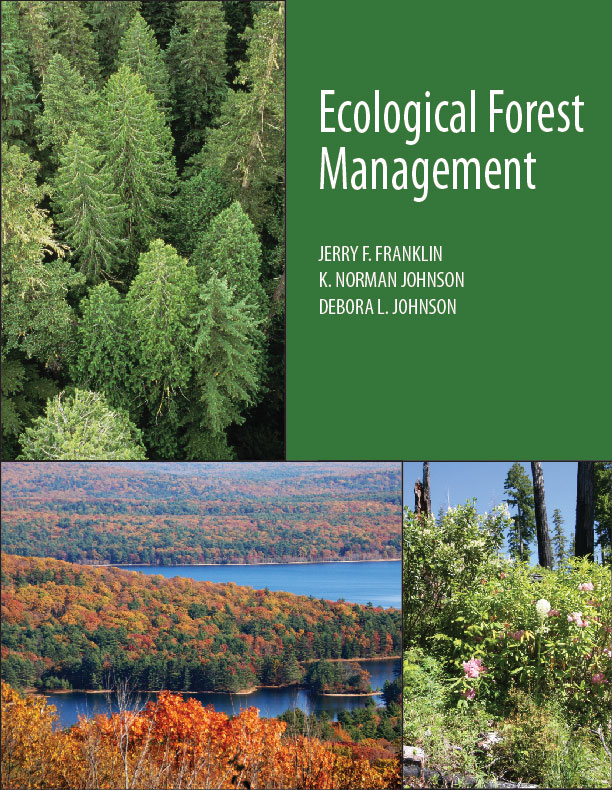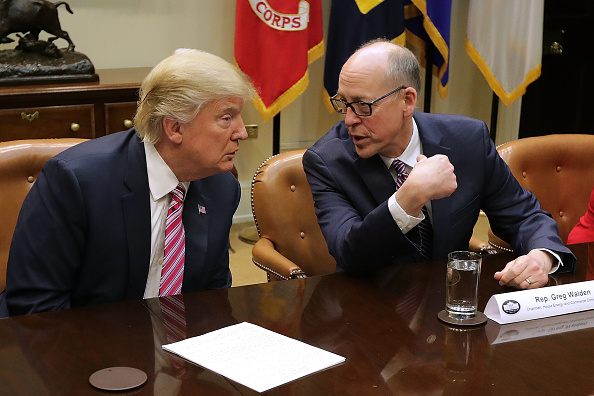The second edition of the book, published in 1966, was authored by Lawrence S. Davis (son of Kenneth P.). For the third edition, published in 1987, the subtitle was dropped and K. Norman Johnson added as a co-author. (Norm is the first Johnson in Franklin, Johnson, and Johnson.) The fourth edition, published in 2001, had two additional co-authors, Pete Bettinger and Theodore E. Howard, and a new subtitle: Forest Management: To Sustain Ecological, Economic, and Social Values. The fourth edition started with McGraw-Hill’s red cover, but when the book was acquired by Waveland Press it gained a cover picture of a managed (but at least not clear-cut) forest. The new subtitle is an acknowledgment that forests are more than just standing logs. The evolution of subtitles parallels the evolution of forestry in America.
Norm and Jerry, along with Larry Davis, were slotted to produce the fifth edition of Forest Management but the found the effort “too limiting.” In addition, Davis was unable to continue. The result is Ecological Forest Management, part memoir and all textbook. EFM is an existential challenge to PF. Continuing to bear the flag of PF (albeit a bit less intense than previously), Pete Bettinger (once a grad student of Norm’s) and three other authors have published Forest Management and Planning, an updated and shortened successor to the fourth edition of Forest Management.(As for the cover, it’s about one-half pretty forest canopy with the remainder a pastoral setting and large bodies of water; do not judge a book by its cover.)
Seeing the Forest Beyond/Below the Trees
PF generally sees a natural stand as needing to be regulated by clear-cutting and then planting it with one species of conifer, thus truncating the forest cycle either as soon as financially possible (maximum economic value [aka net present value]) or when the annual rate of board-feet gain starts to diminish (maximum timber volume). The practice of EFM starts with the premise of both understanding and appreciating the natural functions of the forest, conserving them if possible or at least mimicking them as wood is extracted from the stand.
Chapters 2 and 3 of Ecological Forest Management describe and explain natural forests as ecosystems and detail their developmental stages. These two chapters are worth the price of the book alone. The authors contribute to our understanding of forests by describing six developmental stages:
1. disturbance and legacy creation event (DLC)
2. preforest stage (PFS)
3. forest canopy closure event (FCC)
4. young forest stage (YFS)
5. mature forest stage (MFS)
6. old forest stage (OFS)
The book presents three archetypical forests, distinguished by disturbance regimes and the dominant tree species:
1. conifer-dominated forests initiated by infrequent (episodic) severe wildlife
2. hardwood-dominated forests initiated by infrequent (episodic) severe windstorms
3. conifer-dominated forests characterized by frequent (chronic) wildfire
Earlier, the authors were bifurcating conifer forests into either moist or dry conifer forests but have dropped those descriptors in this book. While the three archetypes aid understanding, numerous variations exist within and between this trifurcated categorization. For example, hardwood forests sometimes burn, moist conifer forests sometimes blow down, and dry conifer forests tend to have all developmental stages simultaneously.
On the Ecological Forest Management Bus
There is much good to be said about the practice of EFM.
Every view has a reference point. Not just aesthetically but also ecologically and hydrologically, EFM is a vast improvement over PF with its clear-cuts and short rotations with their straight rows of same-spaced, same-age, same-size, same species of trees.
A subpart of EFM is scientifically sound ecological restoration thinning—judicious logging that can put moist-forest plantations on a track to achieve older forest character and also can restore grazed-off, fire-excluded, high-graded dry forest stands so they can again become structurally and functionally diverse older forests.
Practiced on lands where the landowner requires some return on investment—if only to at least to pay the taxes if not the kids’ college tuition or their health care expenses down the road—EFM makes much more sense than PF.
While EFM is also the most responsible way to manage corporate industrial timberlands, any serious application of EFM cuts into the net present value goal of profit maximization to the chagrin of investors. Government regulation is in order.
Off the Ecological Forest Management Bus
The practice of EFM has a lot going for it, but it’s not a fat-free hot-fudge sundae (something universally desired with no downsides that doesn’t exist). There is some (very important) bad to be said about EFM.
Every view has a reference point. Compared to the natural forest, EFM is degradation, not just aesthetic but also ecological and hydrological.
Franklin, Johnson, and Johnson tout EFM as an ecologically, economically, and socially acceptable way to manage forests of all ownerships. While they acknowledge and genuinely appreciate the importance of permanently conserved areas (where no roading and logging is allowed) as a vital part of the forest landscape, they generally believe that EFM can sustain forests across the landscape. Many scientists recommend that much more of our forests needs to be in permanent reserves.
Although EFM is very useful to inform the ecological restoration of degraded federal forests—be they moist-forest plantations or fire-excluded, cow-bombed, and high-graded dry conifer forests—it’s general practice, which still is somewhat timber volume-driven, is most appropriate on nonfederal lands.
For the Next Edition
The authors say that “we view this volume as a first approximation of ecological forest management and most certainly not the final word, which we do not expect ever to be written!” In anticipation of a second edition, here are a few major comments and suggestions, offered with respect and admiration, but also with insistence.
• Acknowledge the enormous and important difference between a natural complex preforest stage and an unnatural simplied preforest stage.
With regard to the preforest stage (PFS)—formerly called “early-successional ecosystems on forest sites”—that develops after a disturbance and legacy creation event (DLC; fire, wind, insects, or volcano), there is a huge difference in the biological legacies of a DLC’d old-growth stand and the DLCing of an already disturbed, degraded, and simplified plantation. The biological legacy (consisting of live and dead trees, both standing and fallen; coarse woody detritus; and/or undisturbed understory) of a complex natural PFS dwarfs that of an unnatural simplified PFS. For more, please see the peer-reviewed journal article of which Jerry is the second author.
• For natural stands on federal public lands, advise no logging.
The social license, to which the authors give great weight, has expired for logging of older (mature and old-growth) forests, save for limited and scientifically sound restoration of some hammered dry forest conifer stands. Even if the authors still do not consider it harmful to log perfectly natural stands, albeit more sensitively but still in pursuit of timber volume, the public isn’t going there. The highest and best use of natural forests is not a less harmful form of logging. Even on the Bureau of Land Management’s O&C lands in western Oregon, any timber-first! emphasis of the O&C Lands Act of 1937 has been superseded by the Clean Water Act, the Endangered Species Act, other federal statutes, and—most importantly—public opinion.
• Tell readers how much of the forest landscape should be in no-cut (with a limited exception for ecological restoration) reserves.
Legendary Harvard naturalist E. O. Wilson, in his book Half-Earth: Our Planet’s Fight for Life, recommended that to avoid massive species extinction (a fair criterion for minimum sustainability), at least half of our planet, meaning at least half of its forests of all ownerships, needs to be fully set aside for nature. This is backed up by the peer-reviewed science, including the journal editorial Bolder Thinking for Conservation by Reed Noss and eleven other distinguished ecologists, which opens by asking:
Should conservation targets, such as the proportion of a region to be placed in protected areas, be socially acceptable from the start? Or should they be based unapologetically on the best available science and expert opinion, then address issues of practicality later?
These researchers reviewed the science and answered that at least 50 percent of Earth should be in protected areas.
For Earth’s forests to remove enough excess carbon dioxide from the atmosphere to actually move the needle on climate change, half is not enough.
• For natural stands on federal public lands, advise no logging.
The federal public lands in the American West should form the ecological and geographic basis for that half of the forests in the United States that need to be in permanent reserves. (As for the American East, the existing national forests need to be filled in by acquiring unoccupied private inholdings, and a whole lot of additional national forests need to be established.) Any logging on national forests should be a by-product of ecological restoration, not a product of ecological forest management. The science of species conservation, as well as the wishes of the public, demands it.
• Insist upon more fire.
A major reason that the authors recommend variable retention harvest in unlogged natural stands is to provide more preforest stage (PFS). The authors are quite right that this highly important stage of forest development and biological diversity is far more scarce than old-growth forests, due to routine salvage logging after natural events such as fire and windstorms. Of course, some commercial logs make their way to the mill, which raises suspicion in the minds of many as to motive. We’d have plenty of PFS—and complex PFS at that—if the federal agencies would fully eschew salvage logging, and even more if these federal agencies would embrace forest fire as both generally desirable and always inevitable. I believe that the authors are not uncomfortable with fires in forests, but they recognize the extreme discomfort (due to brainwashing) of the public (finish this six-word sentence: “Only. . . ”) and the hegemony of the fire-industrial complex (federal forest agencies, state fire agencies, Congress, private contractors, and more). This fire-fighting juggernaut is as hugely expensive as it is ineffective, and it arose from and is part and parcel of production forestry. Speaking truth to production forestry needs to include speaking truth to its ancillary fire-industrial complex.
On the Whole
The forests of the world will be better off for the publication and utlitization of Ecological Forest Management.
May ecological forest management deliver the death blow to production forestry. May EFM become the norm for nonfederal forestlands. May EFM not become the norm on federal forestlands, where instead the norm should be the full conservation of intact forests and the restoration of damaged forests.


















